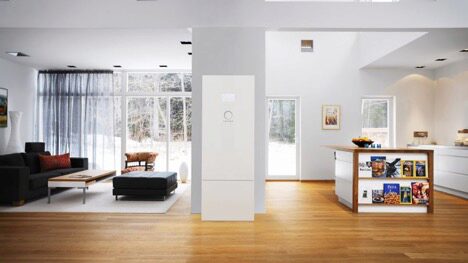Capstone season is upon us and there are over 50 Mechanical Engineering teams showcasing their projects at the Expo on December 4th at the McCamish Pavilion! The Capstone Design course is generously supported by numerous corporate partners and alumni. This week’s spotlight sponsor is first-time Capstone Design sponsor, Sonnen. Sonnen is an energy storage company headquartered in Germany that designs and manufactures batteries for residential and small business use. Sonnen’s vision is for “everyone… to cover their energy needs with [a] decentralized and clean energy source”. The company sticks to its principles of clean energy as their headquarters is in Wildpoldsried, which is a village that is currently running on 100% clean and renewable energy. By producing the sonnenBatterie, the company has already begun making energy storage systems available to the mass market.
Team 1: EnerJackets - Alex Gray, Rafael Garcia, Keivan Farhan, Kenta Yasuda, Madeline Kanne, Kate Moss
Problem: Sonnen’s energy storage systems use Lithium-ion batteries that must stay between -10 to 45 degrees Celsius to function properly. The largest Sonnen energy storage system designed for the mass market is approximately the size of a refrigerator. Currently, Sonnen’s battery storage systems can only be used indoors where temperature can be regulated. Because of the inverter’s size, they are limited to consumers that can manage the large indoor space consumption.
Projected Impact: By creating a casing for the batteries that can withstand outside elements and temperatures, Sonnen can market their product to places in more extreme climates and a larger portion of their target market. A weather-proof and temperature regulated casing removes the indoor space constraint. This allows consumers to install the energy storage outdoors, similarly to an air conditioning unit making it more convenient for residential consumers. Sonnen has a European community called sonnenCommunity where consumers can produce and store their own power while sharing their additional energy with other members of the community. This is the beginning of achieving their vision of clean energy becoming commonplace within the next 20-30 years.
Proposed Solution: Team ‘EnerJackets’ is creating a battery enclosure to protect Sonnen batteries from outside elements. The solution that the team creates must have an IP 54 rating, meaning that it must protect the battery from solid particles larger than 1 mm and be protected from water 60 degrees off of the vertical. The battery must also be able to function with outdoor temperatures of 0 to 115 degrees Fahrenheit. They must be able to remove 143 watts of heat for their design to be successful. So far, the team has been experimenting with different fan models and the number of fans used to cool the enclosure. They are running computational fluid dynamics (CFD) on SolidWorks to test various scenarios and determine the best most effective option.
Team 2: The Jigawatts sonnen Project 2: Electric Boogaloo - Jeremy Leff, Eugene Lee, Chris Nowack, Kristie Teoh, Kyle Olson, Lorenzo Garcia
Problem: According to a research paper written by Dr. Salahuddin Qazi and Mr. Farhan Qazi called “Green Technology for Disaster Relief and Remote Areas”, the number of natural disasters worldwide has increased steadily over the past 40 years. After a natural disaster, the infrastructure for that area is damaged or destroyed. This can leave disaster-hit areas without access to electricity for days or even years. Power generators are typically brought in by disaster relief authorities, but they are often large and bulky which can make them difficult to move to disaster areas.
Projected Impact: When Hurricane Maria hit Puerto Rico in 2017, at least 11% of homes and businesses on the island did not have electricity restored within 6 months. When the storm hit, 80% of the island’s power lines and generators were rendered unusable leading to the longest and largest blackout in US history. After the disaster, large solar panels were shipped in and set up in affected areas to provide power off the grid. The goal for this project is to create a portable solar-powered generator that can be moved by a single person. With disaster zones, large solar panel farms may not be feasible for all affected areas. The option of a small, mobile device may help families who do not have access to power set up by disaster-relief efforts.
Proposed Solution: Sonnen is enlisting help from a team of Georgia Tech students to create a small and portable solar-powered generator using an existing Sonnen battery. Their main focus will be on the portability aspect of the generator. The team has designed their solution using CAD software and plan to build out a prototype using wood and metal for proof of concept. Their design include a retractable handle for users to grab onto when transporting the generator but that also tucks away to make it more compact. They plan to build a full-scale prototype later-on using aluminum because the metal is cheap and lightweight.

Check out these projects and over 200 other exciting capstone design teams at the Fall 2018 Capstone Design Expo on December 4th at 3 pm in the McCamish Pavilion. More information on how to RSVP is on the website here: http://expo.gatech.edu/. Please invite friends and family to attend and cheer for our graduating seniors!
All senior students in Mechanical Engineering culminate their undergraduate educational experience with the Senior Capstone Design course in order to provide firsthand experience at solving real world problems in a team environment. Students typically work in teams of four to six individuals and each team is advised by a faculty member. Companies interested in submitting a project for consideration can contact Dr. Amit S. Jariwala, at 404-894-3931 or via email at: amit.jariwala@gatech.edu.
